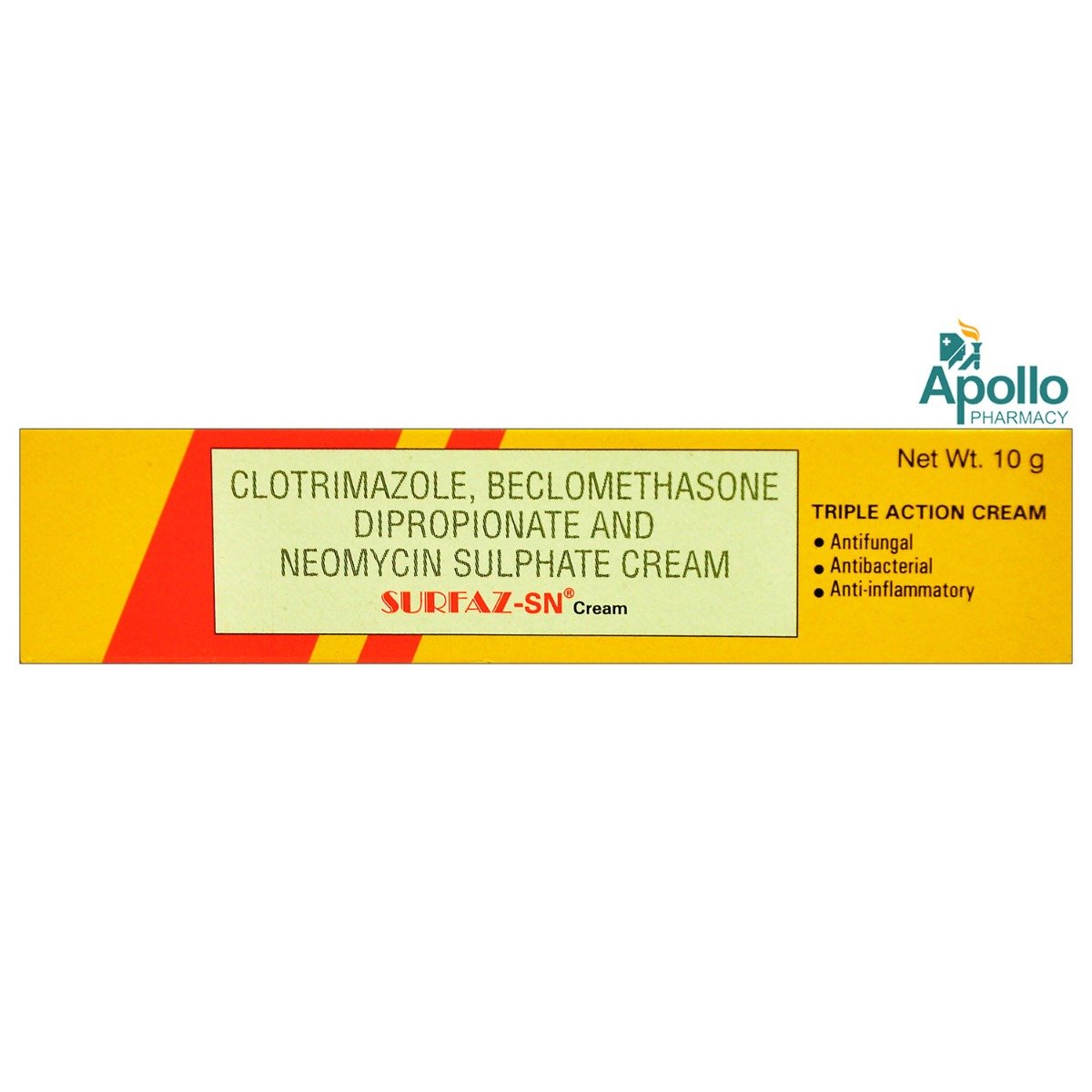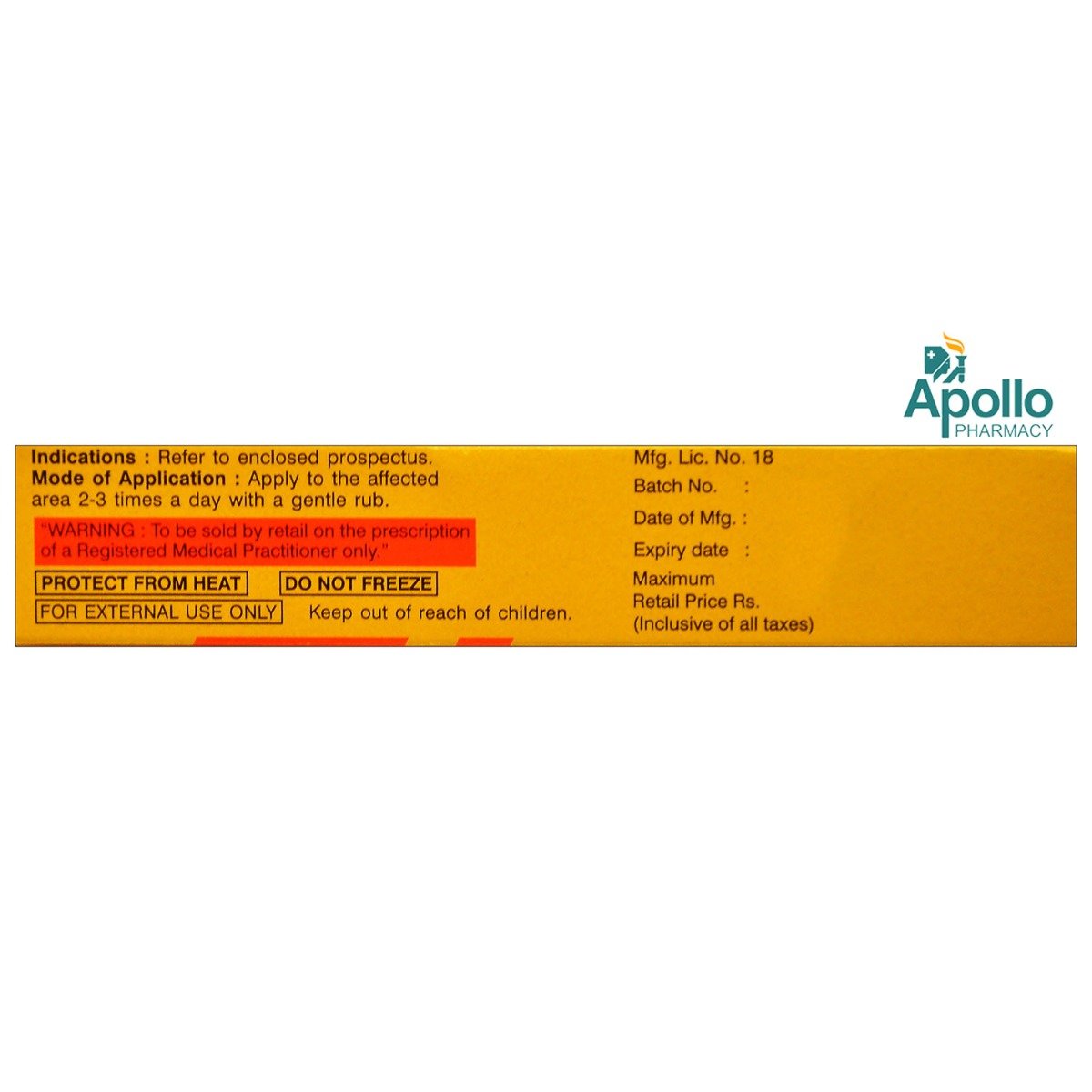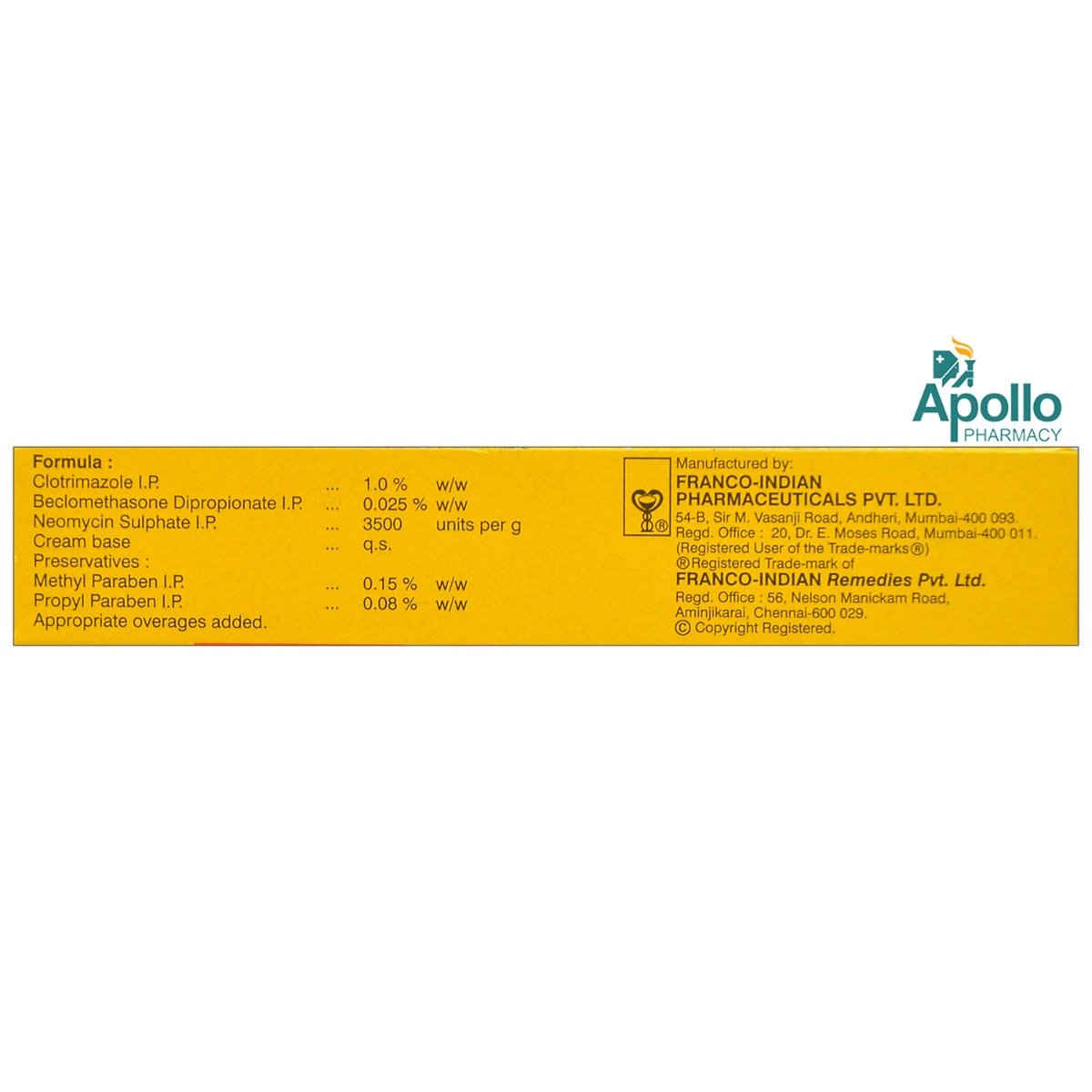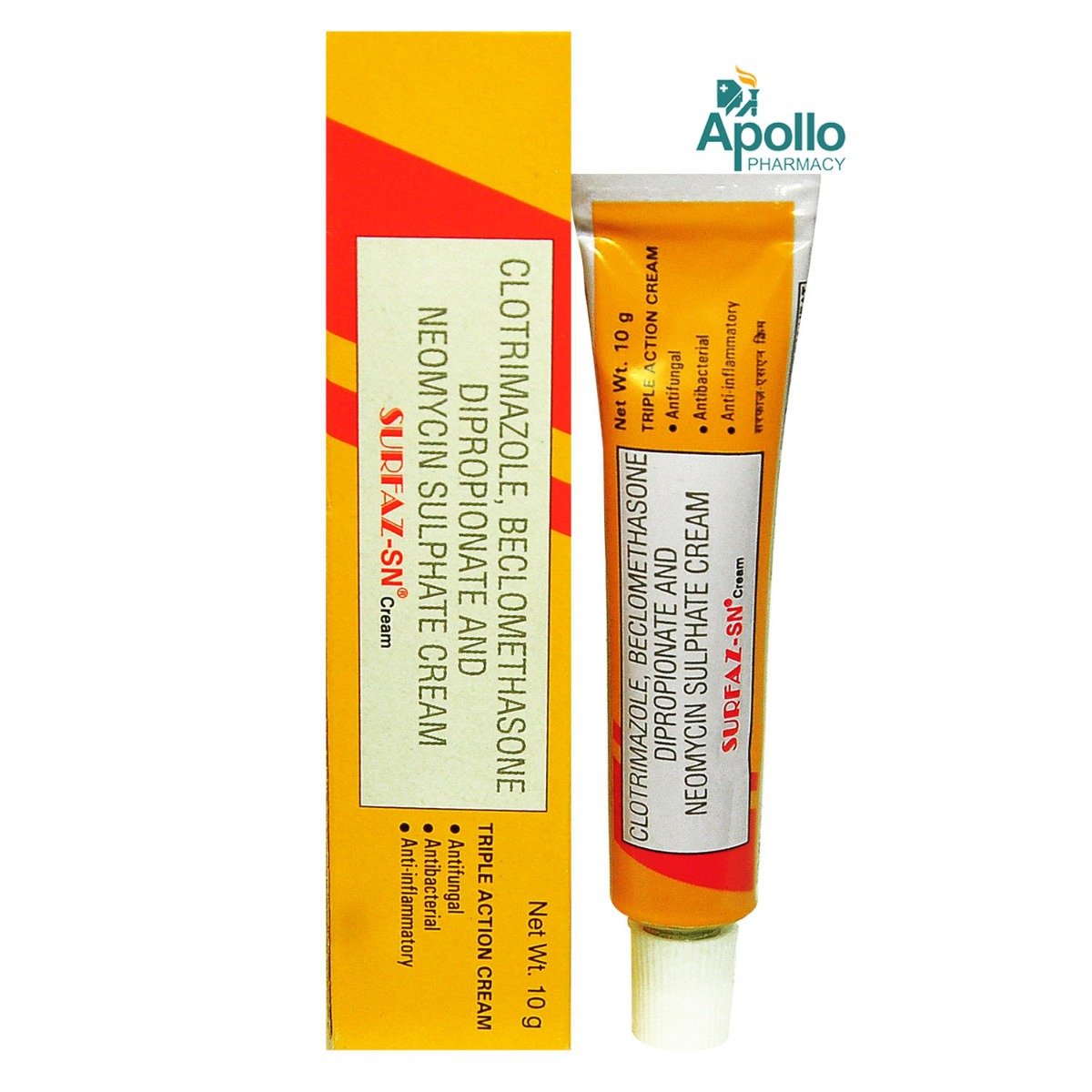Surfaz SN Cream 10 gm
MRP ₹99
(Inclusive of all Taxes)
₹14.8 Cashback (15%)
Selected Pack Size:10 gm
10 gm ₹89.2
(₹8.92 per gm)
In Stock
7 gm ₹89.2
(₹12.74 per gm)
In Stock
Provide Delivery Location
Online payment accepted
 Prescription drug
Prescription drugWhats That
Manufacturer/Marketer :
Consume Type :
Expires on or after :
Return Policy :
About Surfaz SN Cream
Surfaz SN Cream is a combination of medicine primarily used to treat fungal and bacterial skin infections. It treats skin inflammation due to allergies or irritants, eczema (inflamed, itchy, cracked and rough skin patches), psoriasis (skin cells multiply rapidly to form bumpy/uneven red patches covered with white scales), insect bites and stings. Bacterial infection occurs when harmful bacteria grow in the body and causes infection. Fungal infection is caused when a fungus invades and affects the tissue on the skin.
Surfaz SN Cream is composed of three medicines: Clotrimazole, Neomycin and Beclomethasone dipropionate. Clotrimazole stops the growth of fungi by causing damage and leakage to the fungal cell membrane. Neomycin prevents the synthesis of essential proteins required by bacteria to carry out vital functions and has broad-spectrum activity against aerobic gram-positive and gram-negative bacteria. Beclomethasone dipropionate is a corticosteroid and blocks prostaglandin's production (chemical messengers) that make the affected area red, swollen and itchy.
Your doctor will advise the appropriate dose that suits your infection. Surfaz SN Cream is for topical (for skin use) only. If the medicine gets into your eyes, nose, or mouth, rinse with cold water. Common side effects of Surfaz SN Cream include redness, itching, dryness and a burning sensation at the application site. Most of these side effects do not necessitate medical attention and gradually resolve over time. However, if the side effects persist or worsen, please consult a doctor.
Let your doctor know if you are allergic to any of the ingredients. Do not use Surfaz SN Cream on open wounds, blisters and lesions. Do not put a dressing or bandage on the affected area since it increases the risk of side effects. Please check with your doctor before using Surfaz SN Cream if you have dehydration problems, cataracts or glaucoma, diabetes, gastrointestinal diseases, hearing problems (ototoxicity), osteoporosis (weak and brittle bones), muscle weakness, liver and kidney diseases. Pregnant and breastfeeding mothers should consult the doctor before starting Surfaz SN Cream.
Uses of Surfaz SN Cream
Directions for Use
Key Benefits
Surfaz SN Cream is used to treat fungal and bacterial skin infections, skin inflammation due to allergies or irritants, eczema, psoriasis, insect bites and stings. Surfaz SN Cream contains Clotrimazole (antifungal), Neomycin (antibiotic) and Beclomethasone dipropionate (steroid). Clotrimazole stops the growth of fungi by causing damage and leakage to the fungal cell membrane. Neomycin prevents the synthesis of essential proteins required by bacteria to carry out vital functions. Beclomethasone dipropionate blocks prostaglandin's production (chemical messengers) that make the affected area red, swollen and itchy. Together, Surfaz SN Cream helps treat skin infections.
Storage
- Burning sensation is an abnormal side effect that needs medical attention. To relieve the burning feeling, your doctor may prescribe painkillers or antidepressants.
- Focused exercises can improve strength and reduce burning by soothing muscles.
- Change in lifestyle and improving nutrition can reduce the causes of burning sensation and provide relief.
- Your doctor may suggest nerve block injections as it is related to sensation in the skin.
- Burning feeling in a specific area would need mild electrical currents to reduce pain that targets the nerve affected. This practice must be done only if your doctor mentions it.
- Consult your doctor if you experience skin redness, itching, or irritation after taking medication.
- Apply cool compresses or calamine lotion to the affected skin area to reduce irritation.
- Stay hydrated by drinking plenty of water to help alleviate symptoms and keep your skin soothing.
- Monitor your skin condition closely and promptly report any changes, worsening symptoms, or concerns to your healthcare provider.
- Report the itching to your doctor immediately; they may need to change your medication or dosage.
- Use a cool, damp cloth on the itchy area to help soothe and calm the skin, reducing itching and inflammation.
- Keep your skin hydrated and healthy with gentle, fragrance-free moisturizers.
- Try not to scratch, as this can worsen the itching and irritate your skin.
- If your doctor prescribes, you can take oral medications or apply topical creams or ointments to help relieve itching.
- Track your itching symptoms and follow your doctor's guidance to adjust your treatment plan if needed. If the itching persists, consult your doctor for further advice.
- If you experience burning or stinging sensations and suspect that they may be related to medication, consult a doctor or healthcare expert to determine the cause and best course of treatment.
- Avoid harsh products, extreme temperatures, and other potential irritants that may exacerbate burning or stinging.
- Your healthcare professional may recommend applying a soothing or protective agent, such as a cream, gel, or ointment, to help alleviate burning or stinging.
- Follow your healthcare professional's advice on how to care for the affected area, as gentle cleaning and care instructions may vary depending on the location and severity of the burning or stinging.
- Schedule follow-up appointments with your doctor to monitor your symptoms and adjust your treatment plan as needed. If the burning or irritation persists or worsens, seek medical attention.
Drug Warnings
Before using Surfaz SN Cream, let your doctor know if have a history of dehydration problems, cataract or glaucoma, diabetes, gastrointestinal diseases, hearing problems (ototoxicity), osteoporosis (weak and brittle bones), muscle weakness, liver and kidney diseases or allergic reactions to steroid medicines and antibiotics. Avoid smoking or going near naked flames since Surfaz SN Cream can catch fire and burn easily. Avoid applying Surfaz SN Cream on sunburns, lesions, blisters and open wounds. Surfaz SN Cream is not for oral, ophthalmic (for the eye) or intravaginal use. Let your doctor know if you are pregnant or breastfeeding.
Drug-Drug Interactions
Drug-Drug Interactions
Login/Sign Up
Drug-Food Interactions
Drug-Food Interactions
Login/Sign Up
Diet & Lifestyle Advise
- Use mild soap while taking baths and prefer warm baths.
- Always wear loose-fitting clothes to avoid the further spread of the fungal infection.
- Regularly change your socks and wash your feet. Avoid shoes that make your feet sweaty and hot.
- Do not walk barefoot at places like a gym to prevent fungal and bacterial infections.
- Do not scratch the affected area of the skin as it can spread the infection to other body parts.
- Avoid sharing towels, combs, bedsheets, shoes or socks with others.
- Wash your bed sheets and towels regularly.
- Avoid or limit the intake of alcohol and caffeine.
- Manage stress, eat healthily, drink plenty of water, exercise regularly and get plenty of sleep.
Side Effects of Surfaz SN Cream
- Redness
- Itching
- Dryness
- Burning sensation
Habit Forming
Therapeutic Class
All Substitutes & Brand Comparisons
Author Details
We provide you with authentic, trustworthy and relevant information
Drug-Diseases Interactions
Drug-Diseases Interactions
Login/Sign Up
FAQs
Surfaz SN Cream consists of Clotrimazole, Neomycin and Beclomethasone dipropionate. Clotrimazole stops fungi's growth by causing damage and leakage to the fungal cell membrane. Neomycin prevents the synthesis of essential proteins required by bacteria to carry out vital functions. Beclomethasone dipropionate works by blocking prostaglandin's production (chemical messengers) that make the affected area red, swollen and itchy.
Surfaz SN Cream is for external use only. Avoid contact with eyes. If Surfaz SN Cream gets into your eyes, nose, mouth or vagina, rinse with water. Do not put a bandage or a dressing on the affected area while using Surfaz SN Cream unless advised by the doctor. Do not apply Surfaz SN Cream on sunburns, open wounds, lesions and blisters.
Surfaz SN Cream should be used with caution and under doctor's supervision if you have dehydration problems, cataract or glaucoma, diabetes, gastrointestinal diseases, hearing problems (ototoxicity), osteoporosis (weak and brittle bones), muscle weakness, liver and kidney diseases.
Surfaz SN Cream consists of beclomethasone dipropionate that can cause a rise in blood sugar levels by suppressing insulin secretion. Hence it is advised to consult your doctor before starting Surfaz SN Cream if you are diabetic. Monitor your blood glucose levels regularly.
You are required to maintain at least a three-hour gap after the application of Surfaz SN Cream if you are using more than one topical product.
Please do not stop using Surfaz SN Cream on your own, even if the symptoms are relieved. Your symptoms may improve before the skin infection is completely cured. Continue the usage of Surfaz SN Cream until the course advised by the doctor is finished.
Drug-Drug Interactions Checker List
- BUDESONIDE
- FORMOTEROL
- RITONAVIR
- COBICISTAT
- FUROSEMIDE
- BACITRACIN
- POLYMYXIN B
Special Advise
- It is advised to reach out to your doctor if the infection symptoms persist or worsen after two weeks of treatment.
- Avoid contact with nose, mouth or eyes. If the product comes in contact with these areas accidentally, rinse with water thoroughly.
- Do not wash the treated areas for a minimum of 3 hours after you apply the cream.
Disease/Condition Glossary
Fungal infection: It is a skin disease in which a fungus attacks the tissue and causes infection. Fungal infections may be contagious (spread from one person to another). The symptoms of a fungal infection include scaly skin, blisters, itching, swelling, irritation and redness.
Bacterial infection: It is a condition in which harmful bacteria enter, infect and grow in the body. It can target any part of the body and multiply very quickly. Bacteria come in three basic shapes, namely spherical, rod or spiral-shaped. Bacteria may be gram-positive (have thick cell walls) or gram-negative (do not have cell walls).
Eczema: It is a condition in which skin patches become inflamed, itchy, cracked and rough.
Psoriasis: It is a skin disorder in which skin cells multiply and form bumpy (uneven) red patches covered with white scales.

Have a query?
Alcohol
Safe if prescribed
No interaction was found/established. Please consult your doctor if you have any concerns.
Pregnancy
Consult your doctor
There is limited data on how the Surfaz SN Cream affects pregnancy. Please consult your doctor if you are planning to become pregnant or already pregnant before starting Surfaz SN Cream.
Breast Feeding
Consult your doctor
Please consult your doctor before using Surfaz SN Cream if you are breastfeeding. If you need to apply Surfaz SN Cream on your breasts, don't do this shortly before giving a feed.
Driving
Safe if prescribed
Surfaz SN Cream has no or negligible influence on the ability to drive or use machines.
Liver
Consult your doctor
Let your doctor know if you have any history of liver diseases or hepatic impairment. Your doctor will weigh the benefits and potential risks before prescribing Surfaz SN Cream. However, it is not recommended in patients with severe liver diseases.
Kidney
Consult your doctor
Let your doctor know if you have any history of kidney diseases. Your doctor will weigh the benefits and potential risks before prescribing Surfaz SN Cream. However, it is not recommended in patients with severe kidney diseases.
Children
Safe if prescribed
Surfaz SN Cream is not recommended for children below nine years of age.












_0.jpg?tr=q-85)
